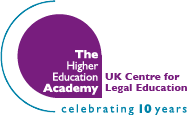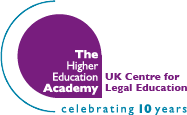Chair's report: Richard Owen
 Parallel Session 4 (Chancellor’s 3)
Parallel Session 4 (Chancellor’s 3)
Chair: Richard Owen (University of Glamorgan)
Both presentations in this parallel session related to issues surrounding assessment and were well attended, provoking lively discussion from several participants.
Assessment in a rapidly changing world – developing a new discourse
The session started with Elizabeth Mytton outlining the theoretical framework drawn from literature, which examines why we assess against the background of external and institutional influences on assessment. It also looked at the opportunities for a new discourse on assessment and how developments in professional academic practice are shaping undergraduate legal education. Essentially assessment is seen as an activity which is resistant to change, as it embodies “many socio-political assumptions about what education is for” (Boud and Falchikov). Surveys have found wide discrepancies between institutions as to the balance between traditional closed book examinations and other forms of assessment.
Paul Wynell-Sutherland then placed this in the context of Liz and Paul’s own institution – Southampton Solent University. There is a strong expectation on the part of the institution to be innovative in assessment methods, with a considerable emphasis on employability. As a result, assessment methods involve a synergy between academic knowledge and practical experience. Assessment is seen as a vehicle for enhancing the student experience and enthusiasm. New technologies are seen as key to the development of new ideas. The National Student Survey was identified as a relatively new external pressure that is shaping assessment methods.
Three pilots of innovative assessment were discussed within the context of how they related to the institutional requirements of employability and student engagement. This involved not only new assessment methods but also new forms of teaching delivery and cross faculty co-operation.
The presentation provoked considerable discussion. Delegates felt that stakeholders had very high expectations of assessment methods. They expect high standards, innovative methods that develop employability and high levels of student engagement. It was thought that it was unrealistic to expect all of these expectations to be met all the time.
There was disagreement about the use and effectiveness of new technologies and whether they are capable of raising levels of attainment. In particular, mobile phone technology was seen by some as impairing the development of students’ communication skills but seen by others as simply creating new methods of communication.
Student understanding of the criteria used for assessment, and the relationship to their perceptions concerning feedback
Dr Penny English took the relatively low scores that are given to assessment and feedback across the higher education sector in the National Student survey as her starting point. Despite the fact that great efforts have been made to improve the quality of feedback, it still remains an issue.
Penny argued that feedback needs to be aligned with other elements of the learning experience. In particular, students have difficulty in making sense of learning outcomes and assessment criteria. Attempting to improve feedback when understanding of what the assessment is trying to achieve is weak will only have limited effects.
The preliminary results of a project to rewrite assessment criteria and grade descriptors and embed these within feedback to students was discussed by Penny, so that students have a better understanding of the whole higher education culture.
The project resonated widely with delegates. There was a feeling that tutors have a literacy in the language of assessment, which is not easily accessed by students. It was agreed that in order to enhance student performance tutors will have to make the language of assessment easier to understand.
Last Modified: 7 March 2011



Comments
There are no comments at this time